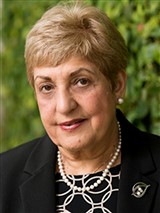Mona E. Zaghloul
Mona E. Zaghloul | Full Professor | The George Washington University
 Driven by her persistence and desire to set a good example for and inspire other women, Mona E. Zaghloul has been a pioneer in her field of engineering and excelled as an educator at the George Washington University since 1980. She was the first woman to be hired in the institution’s engineering department as an assistant professor before becoming a tenured professor, served as chair of Electrical Engineering and Computer Science for four years, and became the first woman promoted to a full professor position there in 1989. In addition, she is the director of the George Washington University’s Institute of MEMS and VLSI Technology, wherein she conducts research in the digital and analog design of VLSI (very Large-Scale Integration) circuits, VLSI systems applications, and the design and implementation of micro and nano sectors using micro and nanotechnology. An innovator when it comes to chip design, she introduced courses on the subject at the university and trained many students who are now working for large companies, such as Intel. She has published more than 300 technical papers across such subjects as circuits and systems and microelectronics systems design, contributed to numerous books, and holds several patents related to electrical engineering.
Driven by her persistence and desire to set a good example for and inspire other women, Mona E. Zaghloul has been a pioneer in her field of engineering and excelled as an educator at the George Washington University since 1980. She was the first woman to be hired in the institution’s engineering department as an assistant professor before becoming a tenured professor, served as chair of Electrical Engineering and Computer Science for four years, and became the first woman promoted to a full professor position there in 1989. In addition, she is the director of the George Washington University’s Institute of MEMS and VLSI Technology, wherein she conducts research in the digital and analog design of VLSI (very Large-Scale Integration) circuits, VLSI systems applications, and the design and implementation of micro and nano sectors using micro and nanotechnology. An innovator when it comes to chip design, she introduced courses on the subject at the university and trained many students who are now working for large companies, such as Intel. She has published more than 300 technical papers across such subjects as circuits and systems and microelectronics systems design, contributed to numerous books, and holds several patents related to electrical engineering.
Prior to her appointment at the George Washington University, Dr. Zaghloul’s professional path was shaped in her home country of Egypt. Born and raised there, her parents were professors of chemistry—which informed her academic excellence and own career goals. She earned a bachelor’s degree in electrical engineering from Cairo University in 1968, serving as the first woman to earn such a degree at its School of Engineering, after which she relocated to Canada and furthered her education at the University of Waterloo—where she attained a master’s degree in electrical engineering in 1970, a master’s degree in applied analysis and computer science in 1971, and ultimately was the first woman to earn an engineering doctorate at the institution in 1975. She was subsequently active as a postdoctoral researcher at her alma mater and at Aalborg University in Denmark before working at Computer Sciences Corporation, now known as DXC Technology, and then served as a research contractor at NASA Goddard Space Flight Center in 1978.
Outside of her primary endeavors, Dr. Zaghloul has lent her expertise as a guest researcher at the National Institute of Standards and Technology from 1984 to 2006 and as a program director in the Division of Electrical, Communications and Cyber Systems of the National Science Foundation from 2014 to 2016. She’s a life fellow with the Institute of Electrical and Electronics Engineers and has also been incredibly active as a volunteer for numerous community charities. As a testament to her remarkable impact on academia and science, she was recognized with a Circuits and Systems Jubilee Golden Medal and named a Circuits and Systems Society Distinguished Lecturer by the IEEE and since 2013, she has been awarded research grants on MEMS Circuits and Sensors from numerous federal agencies and commercial companies.
Looking toward the future, Dr. Zaghloul strives to conduct impactful research that addresses problems and issues society is facing; she is currently working on a device that can identify and detect the coronavirus and how to handle it. Her husband, Amir, also works as an engineer and their two children are following in their footsteps by being involved in the science and engineering fields.
Site powered by Who’s Who Publishers